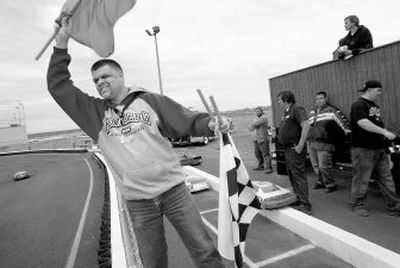Small cars bring big thrills

PASCO – Talk to the men and women who race quarter-scale radio-controlled cars on a speedway about 10 miles north of Pasco and you might wonder what could be so thrilling about it.
Sure, the 30-pound plastic and metal cars race by at an impressive 45 to 50 mph, taking a lap around the 400-foot track in six to eight seconds. And the high-pitched screams of their 23-cc engines are music to any NASCAR lover’s ears.
But several of the hobbyists have sat behind the wheel of real race cars. So an objective observer might wonder how standing alongside the track, away from the action, driving a miniature car could beat the real thing.
Kathy Pfister, 55, a veteran of real racing, provides an answer. She drove her son Zach’s Pure Stock race car 11 years ago when he graduated to the Super Four class. Now her eyes light up when she talks about radio-controlled racing.
“We don’t have to worry about the blood and guts and head injuries,” she said with a smile.
She and her husband, Steve Pfister, 55, own Northwest R/C Speedway – an oval blacktop track on East Sagemoor Road.
They built the track several years ago next to their crop-dusting business as an outlet for their personal hobby. But about 13 area radio-control racers convene there for a dozen Washington State Quarter-Scale Association races each year from March to October.
The track and the locally-based association attest to the increasing popularity of radio-controlled racing among adults in Franklin County and throughout the Northwest. They race quarter-scale, eighth-scale and 10th-scale cars that generally are too expensive for children but serve just fine as grownup recreation.
George Otto, 35, of Kennewick, works as a Parker Paint sales manager, but he recently bought the outer body of a sportsman class car to fit over a chassis that he borrowed from Steve Pfister. Otto also paid for the tires and radio controller.
Quarter-scale cars run up to $1,800 for a new car, or between $800 and $1,300 for a used one. Enthusiasts like Pfister say they’re happy to share spare cars or parts to get someone else started.
Smaller eighth- and 10th-scale cars can run about $500 to assemble, said Kent Mosbrucker, 34, a Connell city councilman. He said he races eighth-scale cars on dirt tracks and parking lots with friends from Seattle.
Several other Connell residents also are into the hobby, he said. The City Council recently granted his group permission to develop a dirt track on a city lot.
The hobby doesn’t involve drinking, and the fumes from the gas preclude even smoking. Gambling doesn’t come into play either, he said. The competition is enough to keep it interesting, he said.
“Oh, there’s a little bit of competition,” Mosbrucker said. “If there’s somebody out there, you gotta go faster than they do. You come up with little upgrades or changes to your truck you didn’t tell them about.”
Racers such as Brent May, 50, of Kennewick, get into the science and mechanics of fine-tuning their cars. They use infrared gauges to check the temperatures of their tires and the track’s surface.
And then there’s the thrill of a crash.
In the heat of a sprint class race last month at Northwest R/C Speedway, Zach Pfister, 28, watched from the operators’ platform as his car collided with one owned by Bob Knox of Baker City, Ore.
The back of Pfister’s car lost traction, so he let up on the gas. Knox’s car kept at full speed as Pfister’s slowed, and the two collided with a loud smack.
When Pfister had retrieved his car from the racetrack, he saw that it was bent a little but nothing that he couldn’t repair.
“You worry about your car as well as the other guy’s,” he said with a chuckle. “It gets your heart pumping a little bit.”
And as they say, any crash you can walk away from is a good one. So they’re all good in radio-controlled racing.